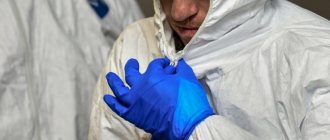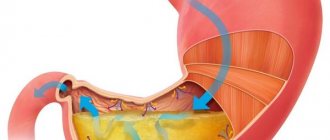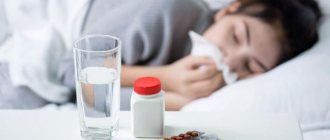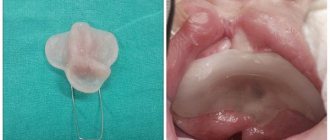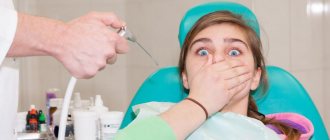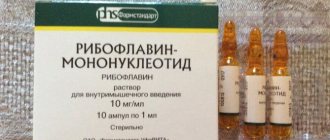Photo: koffkindom. ru
Photo: koffkindom. ru
— There have been active advertisements of iodine preparations on TV for many years. I heard that it is simply necessary for residents of the Amur region. And at an appointment with my friend, an endocrinologist told me that since she was over 40 years old, she couldn’t take iodine tablets. Why? - asked Tatyana Ustinova from Blagoveshchensk.
Elvira Sayutina, an endocrinologist of the highest category at Blagoveshchensk City Clinical Hospital, answers:
— Iodine preparations must be taken. But! Firstly, tableted iodine is for young people - up to 40 years old. After 40, taking it may be fraught. If a person has been drinking iodine tablets since the age of 20, everything is fine; when he turns 40, let him continue drinking. But if at the age of 43 a person suddenly gets the idea: should I somehow influence the thyroid gland, then it’s not worth doing.
Iodine preparations should be prescribed for preventive purposes to young healthy people, children, adolescents, pregnant and lactating women. These are people whose need for iodine is very high at the moment.
Doctors recommend that Amur residents over 40 years old eat foods rich in iodine.
Let me also remind you that iodine preparations should also be prescribed by a doctor - an endocrinologist. After all, an excess of iodine, like its lack, is also not good - this is a risk of developing hyperthyroidism, thyrotoxicosis, there is the concept of iodine-induced thyrotoxicosis. And if a person has nodes in the thyroid gland, the question arises: is it necessary, is it indicated to take iodine? To do this, you need to undergo a series of examinations. Let's say a person comes for an appointment - he lives in an endemic area (an area whose residents experience a lack of iodine - AP note), we do him tests for hormones, and he, for example, has a toxic goiter. Iodine supplements are contraindicated for him. Not only will they not bring him any benefit, but they will harm him.
— If iodine in tablets is for people under 40 years old, then after what?
— Foods rich in iodine: seaweed, seafood, sea fish, iodized salt.
What is the meaning of such an age limit: a person lives for 40-45 years in a state of chronic iodine deficiency - this is like what we have in the Amur region. And suddenly he decides to take iodine tablets - regularly, on time. No other organ in the body except the thyroid gland needs iodine. And the thyroid gland, being in a state of chronic iodine deficiency, begins to grab this iodine, grabs it and pulls it on itself out of greed. She stores it, stores it, stores it - in the end this can provoke disorders, hyperfunction of the gland. Everything must be done on time. If it was prescribed to you on time and you started taking it on time, then you can continue after 40 years, provided that your hormones are normal and there are no nodes in the thyroid gland.
Iodine is a serious drug. Remember, there used to be a drug called antistrumin? Small white tablets, delicious. Back in Soviet times, somewhere in central Russia there was a case of children being poisoned with iodine. The teacher came to the class and put a bottle: children, take one of each. One tablet contains a dose of 1000 micrograms, while the daily norm for an adult is 200. Antistrumin was given once a week. And the children - the pills were sweet - ate several of them.
Now iodine comes in micronized doses - one tablet contains the daily dose. You won’t find Antistrumin in Russian pharmacies now.
Age category of materials: 18+
- Amurskaya Pravda from 03/01/2019
Pharmacokinetic properties
The usual route of iodine administration is the gastrointestinal tract. Iodine can also enter the body through the skin and body cavities. This should be especially taken into account when accidentally taking pharmacological iodine.
In the small intestine, inorganic iodine is absorbed almost 100%, while absorption through the skin is negligible and uncontrollable. The volume of distribution in healthy people averages about 23 liters (38% of body weight). Indicators of inorganic iodine content in blood serum usually range from 0.1 and 0.5 μg/dl. In the body, iodide accumulates in the thyroid gland and in other tissues, such as the salivary glands, mammary glands and stomach. The concentration of iodide in saliva, gastric juice and milk is approximately 30 times higher than its concentration in plasma. Urinary iodine excretion, most often indicated in mcg/g creatinine, serves as a criterion for iodine supply, since in a balanced state it correlates with the daily intake of iodine from food.
Pharmacological properties
Pharmacodynamics.
Iodomarin is a medicine of inorganic iodine. Iodine is a vital trace element that is part of the thyroid hormones - thyroxine (t4) and triiodothyronine (t3) and ensures its normal functioning. When iodides enter the epithelial cells of the thyroid follicles, under the influence of the enzyme iodide peroxidase, iodine is oxidized to form elemental iodine. The substance enters into a substitution reaction with the aromatic tyrosine cycle, resulting in the formation of thyronines: 3,5-iodo derivative (thyroxine hormone - T4) and 3-iodo derivative (hormone triiodothyronine T3). Thyronines form a complex with the protein thyroglobulin, which is deposited in the colloid of the thyroid follicle and remains in this state for several days and weeks. With iodine deficiency, this process is disrupted. Iodine, which enters the body in physiological quantities, prevents the development of endemic goiter; normalizes the size of the thyroid gland in newborns, children, adolescents and adult patients; affects the T3/T4 ratio, TSH level.
Pharmacokinetics. After oral administration, inorganic iodine is almost completely absorbed in the small intestine. Within 2 hours after absorption, iodine is distributed in the intercellular space; accumulates in the thyroid gland, kidneys, stomach, mammary and salivary glands. The volume of distribution in a healthy person averages 23 liters (38% of body weight). The concentration in blood plasma after using a standard dose is 10–50 ng/ml, while the iodine content in breast milk, saliva, and gastric juice is 30 times higher than the concentration in blood plasma. The thyroid gland contains ¾ (10–20 mg) of all iodine found in the body. Iodine is excreted mainly in the urine, and to a lesser extent in feces and exhaled air. When equilibrium concentration is reached, the amount of iodine excreted is proportional to the daily intake from food.
Directions for use and doses
Recommended dose
:
Prevention of goiter due to iodine deficiency
Babies and children
:
Up to ½ tablet of Iodomarin®200 (corresponds to 100 mcg iodine) once a day.
Teens and adults
:
½ - 1 tablet of Iodomarin®200 (corresponds to 100 - 200 mcg of iodine) once a day.
Pregnancy and breastfeeding
:
1 tablet of Iodomarin®200 per day (corresponds to 200 mcg iodine) once a day.
Prevention of goiter regrowth after completion of drug treatment or after surgery for goiter caused by iodine deficiency
½ - 1 tablet of Iodomarin®200 (corresponds to 100 - 200 mcg of iodine) once a day.
Treatment of goiter caused by iodine deficiency
Newborns, children and adolescents:
½ - 1 tablet of Iodomarin®200 (corresponds to 200 - 200 mcg of iodine) once a day.
Young adults
:
It is recommended to take 1½ to 2½ tablets of Iodomarin®200 (corresponding to 300 – 500 micrograms of iodine) once a day.
The tablet can be divided into two parts with equal dosage.
General recommendations
Application
Prevention of iodine deficiency and endemic goiter in cases where the intake of iodine into the body of an adult is 150–200 mcg/day. it is necessary to additionally apply the following amount:
- newborns, infants and children under 12 years of age: 50–100 mcg of iodine per day (½–1 tablet Iodomarin 100 or ½ tablet Iodomarin 200);
- children over 12 years of age and adults: 100–200 mcg of iodine per day (1–2 tablets Iodomarin 100 or ½–1 tablet Iodomarin 200);
- period of pregnancy or breastfeeding: 200 mcg of iodine per day (2 tablets Iodomarin 100 or 1 tablet Iodomarin 200).
Prevention of relapse of iodine deficiency goiter after surgical treatment, as well as after completion of complex treatment with thyroid hormones: children and adults - 100-200 mcg of iodine per day (1-2 tablets Iodomarin 100 or ½-1 tablet Iodomarin 200).
Treatment of diffuse euthyroid iodine deficiency goiter:
- newborns, infants and children: 100–200 mcg of iodine per day (1–2 tablets Iodomarin 100 or ½–1 tablet Iodomarin 200);
- young adults: 300–500 mcg of iodine per day (3–5 tablets Iodomarin 100 or 1½–2½ tablets Iodomarin 200).
Mode of application. Take the tablets after meals and drink enough liquid, such as a glass of water. For infants and children under 3 years of age, the drug can be given in crushed form. The use of the drug for prophylactic purposes is usually carried out for several months or years, and more often - throughout life. For the treatment of goiter in newborns and infants, in most cases, 2-4 weeks are sufficient, in children and adults - 6-12 months or more. The question of the dosage and duration of use of the drug for preventive measures or for the treatment of thyroid diseases is decided by the doctor on an individual basis.
Children. The drug is used in children of any age if indicated.
Do not take Iodomarin®200
If you have an allergy to potassium iodide or any other part of this drug
With a clear increase in thyroid function (there are complaints)
With a hidden increase in thyroid function (no complaints) in doses exceeding 150 mcg of iodine per day
In the presence of a benign hormone-producing tumor, as well as uncontrolled hormone-producing areas of the thyroid gland in a dosage of 300 to 1000 mcg of iodine per day (except for treatment in the preoperative period)
Before taking Iodomarin® 200, consult your doctor or pharmacist
Note!
Description of the drug Iodomarin table. 100mcg No. 100 on this page is a simplified author’s version of the apteka911 website, created on the basis of the instructions for use.
Before purchasing or using the drug, you should consult your doctor and read the manufacturer's original instructions (attached to each package of the drug). Information about the drug is provided for informational purposes only and should not be used as a guide to self-medication. Only a doctor can decide to prescribe the drug, as well as determine the dose and methods of its use.
Taking other medications together with Iodomarin® 200
If you are currently taking, have recently taken, or may take any other medicines, tell your doctor or pharmacist.
Iodine deficiency increases the body's response to drug treatment for hyperthyroidism (increased thyroid function), while excess iodine decreases it. Therefore, before or during treatment for hyperthyroidism, you should, if possible, abstain from any iodine intake.
Substances that are absorbed by the thyroid gland by the same mechanism as iodide (for example, perchlorate), as well as drugs that are not themselves absorbed, such as thiocyanate in concentrations exceeding 5 mg/dl, interfere with the absorption of iodine by the thyroid gland.
The absorption of iodine by the thyroid gland and the metabolism of iodine in the gland are stimulated by endogenous and exogenous thyroid hormone (TSH).
Simultaneous treatment with high doses of iodine, which suppress the secretion of thyroid hormones, and lithium salts, usually used to treat mental disorders, can contribute to the development of goiter and hypothyroidism.
High doses of potassium iodide in combination with potassium-sparing diuretics can cause hyperkalemia.
Pregnancy, breastfeeding and fertility
If you are pregnant or breastfeeding, or may or may be pregnant, consult your doctor or pharmacist before taking this drug.
During pregnancy and breastfeeding, the need for iodine increases - therefore, during this period it is especially important to ensure sufficient iodine intake in the body. However, iodine and iodine-containing drugs should be taken only after assessing the benefit/risk ratio and only as directed by a doctor.
Special instructions for the use of the drug Iodomarin
The drug contains lactose, so it should not be used in cases of congenital galactose intolerance, lactase deficiency or glucose-galactose malabsorption syndrome. Use during pregnancy and lactation. During pregnancy and lactation, the need for iodine is increased, so a sufficient intake of iodine in the body (200 mcg/day) is especially important. Due to the penetration of iodine through the placental barrier and the sensitivity of the fetus to it, the recommended doses should not be exceeded. This requirement also applies to the period of breastfeeding, since the concentration of iodine in milk is 30 times higher than that in blood plasma. An exception is high-dose iodine prophylaxis, which is carried out in case of man-made radioactive contamination. Use in children. The drug can be used in children at any age if indicated. The ability to influence reaction speed when driving vehicles or operating machinery. There is no data on negative effects.
If you stop taking Iodomarin®200
If you stop taking Iodomarin® 200, for example due to side effects, tell your doctor.
If you have any further questions about taking this drug, ask your doctor or pharmacist.
Possible side effects
Like all medicines, this drug may cause side effects, which, however, may not occur in all patients.
With the prophylactic use of iodide at any age, as well as with therapeutic use in newborns, children and adolescents, as a rule, no undesirable effects are observed. However, in the presence of extensive uncontrolled hormone-forming areas of thyroid autonomy and the administration of iodine in daily doses exceeding 150 mcg, it is impossible to completely eliminate the clinical manifestations of increased thyroid function.
Very rare: (less than 1 in 10,000 patients)
Immune system disorders
Hypersensitivity reactions, such as iodine-induced rhinitis, skin reactions (bullous and tuberous iododerma, exfoliative dermatitis), swelling of the skin or mucous membranes (angioedema), fever, acne and swelling of the salivary glands.
Disorders of the hormonal system
When used for the treatment of goiter in adults (daily dosage from 300 to 1000 mcg of iodine), in some cases it is possible to increase the function of the thyroid gland caused by iodine. In the vast majority of cases, a prerequisite for this is the presence of hormone-producing foci in the thyroid gland. Elderly patients who have had goiter for a long time are usually at risk.
If any side effects occur, contact your doctor or pharmacist. This applies to any possible side effects, including those not described in this leaflet.
Contraindications
Iodomarin®200 should not be used for:
- a history of hypersensitivity to the active substance or to one of the other components of the drug presented in the excipients
- manifest hyperthyroidism
- latent hyperthyroidism in doses exceeding 150 mcg of iodine per day
-autonomous adenoma, as well as focal and diffuse foci of autonomy of the thyroid gland in a dosage of 300 to 1000 mcg iodine daily (with the exception of preoperative blockade of the thyroid gland according to Plummer).
How to store Iodomarin®200
Keep out of the reach of children
Store at a temperature not exceeding 25°C
Do not use this medicine after the expiration date which is indicated on the outer packaging and on the blister after the words “Best before”. The expiration date is considered to be the last day of the specified month.
Do not dispose of any medications down the drain or in household waste. Consult your pharmacy regarding how to dispose of unwanted medicine. Ethimers help protect the environment.
Iodomarin® 200 is available in packages of 100 tablets (blister).
Overdose of the drug Iodomarin, symptoms and treatment
Symptoms of acute poisoning: brown staining of the mucous membranes, vomiting (if starch-containing components are present in food, the vomit turns blue), abdominal pain and diarrhea (even bloody diarrhea is possible). Dehydration and shock may occur. In rare cases, the development of esophageal stenosis has been noted. Deaths were recorded only after the use of iodine in high doses - from 30 to 250 ml of iodine tincture. There is a report of the development of acute nephritis after simultaneous administration of potassium iodide solution and mefenamic acid tablets. Long-term use can cause the development of the phenomenon of iodism: a metallic taste in the mouth, swelling and inflammation of the mucous membranes (rhinitis, conjunctivitis, gastroenteritis, bronchitis). Latent processes, such as tuberculosis, can be activated under the influence of iodine. The development of peripheral edema, erythema, acne-like and bullous rash, hemorrhage, fever and nervous agitation is possible. Treatment of acute intoxication: gastric lavage with starch, protein or 5% sodium thiosulfate solution until traces of iodine disappear. Carrying out symptomatic therapy to eliminate disturbances in water and electrolyte balance, and, if necessary, anti-shock therapy. Treatment for chronic intoxication: discontinuation of iodine-containing drugs. Iodine-induced hyperthyroidism: This is not an overdose in the literal sense, since hyperthyroidism can also arise from an amount of iodine that is considered physiological in other countries. Mild forms do not require therapy, while severe forms require thyreostatic treatment, the effectiveness of which is delayed over time. In severe cases (thyrotoxic crisis), intensive therapy, plasmapheresis or thyroidectomy are necessary.
Iodomarin 100 tablets 100mkg No. 100 No. 1
Name
Iodomarin tablet 100 µg No. 100
Description
Tablets are white or almost white, round, flat-cylindrical, with a chamfer and a score on one side.
Main active ingredient
Iodine
Release form
Tablets are white or almost white, round, flat-cylindrical, with a chamfer and a score on one side. 1 tab. potassium iodide 131 mcg, which corresponds to the iodine content of 100 mcg Excipients: lactose monohydrate - 75.119 mg, basic magnesium carbonate - 28.25 mg, gelatin - 4 mg, sodium carboxymethyl starch (type A) - 4.75 mg, colloidal silicon dioxide - 1.75 mg, magnesium stearate - 1 mg. 50 pcs. — bottles (1) — cardboard packs. 100 pieces. — bottles (1) — cardboard packs.
special instructions
Effect on the ability to drive vehicles and operate machinery Iodomarin® does not affect the ability to drive vehicles or perform other potentially hazardous activities.
pharmachologic effect
Iodine preparation for the treatment and prevention of thyroid diseases. Iodine is a vital trace element necessary for the normal functioning of the thyroid gland. Thyroid hormones perform many vital functions, incl. regulate the metabolism of proteins, fats, carbohydrates and energy in the body, the activity of the brain, nervous and cardiovascular systems, reproductive and mammary glands, as well as the growth and development of the child. The use of the drug Yodomarin® replenishes iodine deficiency in the body, preventing the development of iodine deficiency diseases, and helps normalize the function of the thyroid gland, which is especially important for children and adolescents, as well as during pregnancy and lactation.
Pharmacokinetics
Data on the pharmacokinetics of the drug Yodomarin® are not provided.
Indications for use
- prevention of endemic goiter (especially in children, adolescents, women during pregnancy and during breastfeeding); - prevention of goiter recurrence after its surgical removal or after the end of drug treatment with thyroid hormones; - treatment of diffuse euthyroid goiter caused by iodine deficiency in children, adolescents and adults under the age of 40 years.
Directions for use and doses
Prevention of endemic goiter Newborns and children under 12 years of age 1/2-1 tab. drug Yodomarin® 100 or 1/2 tablet. the drug Yodomarin® 200 per day (which corresponds to 50-100 mcg of iodine). Children over 12 years old and adults 1-2 tablets. drug Yodomarin® 100 or 1/2-1 tablet. the drug Yodomarin® 200 per day (which corresponds to 100-200 mcg of iodine). During pregnancy and lactation 2 tablets. Iodomarin® 100 or 1 tablet. the drug Yodomarin® 200 per day (which corresponds to 200 mcg of iodine). Prevention of goiter relapse 1-2 tablets. drug Yodomarin® 100 or 1/2-1 tablet. the drug Yodomarin® 200 per day (which corresponds to 100-200 mcg of iodine). Treatment of euthyroid goiter Newborns and children aged 1 to 18 years 1-2 tablets. drug Yodomarin® 100 or 1/2-1 tablet. the drug Yodomarin® 200 per day (which corresponds to 100-200 mcg of iodine). Adults up to 40 years old 3-5 tablets. Iodomarin® 100 per day or 11/2-21/2 tablets. the drug Yodomarin® 200 per day (which corresponds to 300-500 mcg of iodine). The drug is taken after meals with a sufficient amount of liquid. When used in children, it is recommended to first dissolve the drug in milk or juice. Prophylactic administration is carried out for several years, if indicated - for life. For the treatment of goiter in newborns, on average, 2-4 weeks are enough; in children, adolescents and adults it usually takes 6-12 months, long-term use is possible. The duration of treatment is determined by the attending physician.
Use during pregnancy and lactation
During pregnancy and lactation, the need for iodine increases, so it is especially important to use the drug Yodomarin® in sufficient doses (200 mcg/day) to ensure adequate intake of iodine into the body. The use of the drug Yodomarin® during pregnancy and lactation (breastfeeding) is possible only in recommended doses, because the active substance penetrates the placenta and is excreted in breast milk.
Precautionary measures
Can be used in children according to indications.
Interaction with other drugs
Iodine deficiency increases, and iodine excess decreases, the effectiveness of hyperthyroidism treatment with thyreostatic drugs (before or during the treatment of hyperthyroidism, it is recommended, if possible, to avoid any use of iodine). On the other hand, thyreostatic agents inhibit the conversion of iodine into an organic compound in the thyroid gland and thus can cause goiter formation. Simultaneous treatment with high doses of iodine and lithium salts can contribute to the occurrence of goiter and hypothyroidism. High doses of the drug in combination with potassium-sparing diuretics can lead to hyperkalemia.
Contraindications
- hyperthyroidism; — toxic adenoma of the thyroid gland, nodular goiter when used in doses of more than 300 mcg/day (except for the period of preoperative iodine therapy to block thyroid function); - Dühring's herpetiform (senile) dermatitis; - hypersensitivity to iodine. The drug should not be used for hypothyroidism, except in cases where the development of the latter is caused by severe iodine deficiency. Prescription of the drug should be avoided during therapy with radioactive iodine, the presence or suspicion of thyroid cancer.
Compound
Potassium iodide 131 mcg, which corresponds to the iodine content of 100 mcg Excipients: lactose monohydrate - 75.119 mg, basic magnesium carbonate - 28.25 mg, gelatin - 4 mg, sodium carboxymethyl starch (type A) - 4.75 mg, colloidal silicon dioxide - 1.75 mg, magnesium stearate - 1 mg.
Overdose
Symptoms: brown staining of the mucous membranes, reflex vomiting (if starch-containing components are present in food, the vomit becomes blue), abdominal pain and diarrhea (possibly melena). In severe cases, dehydration and shock may develop. In rare cases, esophageal stenosis and the phenomenon of “iodism” were observed. Treatment: in case of acute intoxication - discontinuation of the drug, gastric lavage with a solution of starch, protein or 5% sodium thiosulfate solution until all traces of iodine are removed; in case of chronic intoxication - discontinuation of the drug. Symptomatic therapy for water and electrolyte imbalances, anti-shock therapy. When treating iodine-induced hypothyroidism - discontinuation of the drug, normalization of metabolism with the help of thyroid hormones. When treating iodine-induced thyrotoxicosis, no treatment is required for mild forms; for severe forms, thyreostatic therapy is required (the effect of which is always delayed). In severe cases (thyrotoxic crisis), intensive therapy, plasmapheresis or thyroidectomy are necessary.
Side effect
With the prophylactic use of the drug Iodomarin® in patients of any age, side effects are usually not observed. From the endocrine system: when using the drug in a dose of more than 150 mcg of iodine/day, latent hyperthyroidism can become manifest; when using the drug in a dose exceeding 300 mcg of iodine/day, the development of iodine-induced thyrotoxicosis is possible (especially in elderly patients suffering from goiter for a long time, in the presence of nodular goiter or diffuse toxic goiter). Allergic reactions: rarely - iodism, manifested by a metallic taste in the mouth, swelling and inflammation of the mucous membranes (“iodine” rhinitis, conjunctivitis, bronchitis), “iodine” fever, “iodine” acne; in some cases - Quincke's edema, exfoliative dermatitis.
Storage conditions
The drug should be stored out of the reach of children, in a dry, dark place at a temperature not exceeding 25°C.

